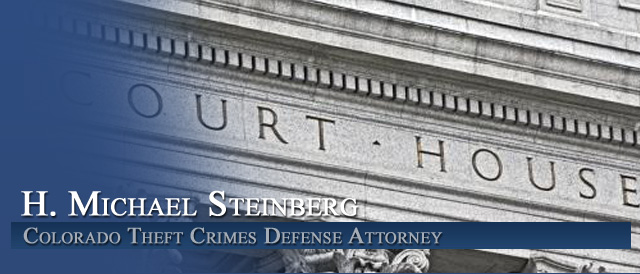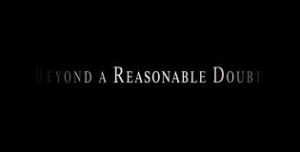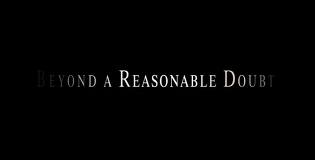




Colorado Criminal Law – What Exactly IS Proof Beyond A Reasonable Doubt – When Juries Should Acquit – Finding The Accused Not Guilty
By H. Michael Steinberg Colorado Theft Crimes Criminal Defense Lawyer
 Colorado Criminal Law – What Exactly IS Proof Beyond A Reasonable Doubt – When Juries Should Acquit – Finding The Accused Not Guilty – I am a Colorado Criminal Defense Lawyer with more than 40 years in the criminal courtrooms of my state. In my opinion – the two most important concepts in the criminal justice system are the “presumption of innocence” and the burden of proof on the State of Colorado – “proof beyond a reasonable doubt.”
Colorado Criminal Law – What Exactly IS Proof Beyond A Reasonable Doubt – When Juries Should Acquit – Finding The Accused Not Guilty – I am a Colorado Criminal Defense Lawyer with more than 40 years in the criminal courtrooms of my state. In my opinion – the two most important concepts in the criminal justice system are the “presumption of innocence” and the burden of proof on the State of Colorado – “proof beyond a reasonable doubt.”
Here are the two concepts in the words of the exact Colorado Criminal Jury Instructions read and handed to the jury in Colorado Criminal Trials:
The Presumption of Innocence
Every person charged with a crime is presumed innocent. This presumption of innocence remains with the defendant throughout the trial and should be given effect by you unless, after considering all of the evidence, you are then convinced that the defendant is guilty beyond a reasonable doubt.
Burden of Proof and Reasonable Doubt
The burden of proof is upon the prosecution to prove to the satisfaction of the jury beyond a reasonable doubt the existence of all of the elements necessary to constitute the crime charged.
Reasonable doubt means a doubt based upon reason and common sense which arises from a fair and rational consideration of all of the evidence, or the lack of evidence, in the case
. It is a doubt which is not a vague, speculative or imaginary doubt, but such a doubt as would cause reasonable people to hesitate to act in matters of importance to themselves.
Each And EVERY Element That Makes Up The Crime – Juries Are Also Instructed as follows in EVERY Colorado Criminal Case
If you find from the evidence that each and every element of a crime has been proven beyond a reasonable doubt, you should find the defendant guilty of that crime.
If you find from the evidence that the prosecution has failed to prove any one or more of the elements of a crime beyond a reasonable doubt, you should find the defendant not guilty of that crime
An Example Of The Elements Of A Colorado Criminal Act – Theft
To understand the elements of a crime – you must understand that every crime is made up of several essential parts – ALL of which must be proven beyond a reasonable doubt before a jury can vote you guilty of a crime. Here are the elements of the common crime of theft – again from the Colorado instruction read to and then handed to Colorado Juries:
4-4:01 THEFT (INTENT TO PERMANENTLY DEPRIVE)
The elements of the crime of theft (intent to permanently deprive) are:
1. That the defendant,
2. in the State of Colorado, at or about the date and place charged,
3. knowingly,
[4. obtained, retained, or exercised control over anything of value of another,
5. without authorization or by threat or deception, and] or
[4. received, loaned money by pawn or pledge on, or disposed of,
5. anything of value or belonging to another that he [she] knew or believed to have been stolen, and]
6. intended to deprive the other person permanently of the use or benefit of the thing of value.
[7. and that the defendant’s conduct was not legally authorized by the affirmative defense[s] in Instruction[s] ___.]
After considering all the evidence, if you decide the prosecution has proven each of the elements beyond a reasonable doubt, you should find the defendant guilty of theft (intent to permanently deprive).
After considering all the evidence, if you decide the prosecution has failed to prove any one or more of the elements beyond a reasonable doubt, you should find the defendant not guilty of theft (intent to permanently deprive).
What Reasonable Doubt Is Not – Preventing The Prosecutor From TWISTING The Burden Of Proof At Trial
Sometimes the prosecutor will twist the burden of proof in “explaining” the concept of reasonable doubt to jurors. Analogies to decisions people make in their “everyday lives” trivialize the jury’s task of deciding the guilt of an accused in a criminal case. Juries are decide one question and one question only – “Has the State proven it’s case BEYOND A REASONABLE DOUBT?”
The reason that comparisons to ordinary decisions in our lives trivializes the degree of certainty required that is required to convict is based on the nature of criminal law.
Everyday decisions do not approach the kind of seriousness that juries must utilize in making a decision on guilt beyond a reasonable doubt.
The use of the term of “sufficient importance” focuses the jury on “the kind of doubt that would make a person hesitate to act, – NOT the kind of doubt on which that person would be willing to act.
This difference is critical. Decisions in which one might choose to act or refrain from acting turns the juror in the wrong direction. These decisions focus on the degree of certainty the jurors would have use if they are willing to act – again – NOT decisions that which would cause them to hesitate to act.
Minimizing Proof Beyond A Reasonable Doubt
The “every day decisions” argument minimizes the importance of the reasonable doubt standard. The jury’s only role is to determine whether the State of Colorado has met its very high burden of proof in a Colorado criminal case.
Here is a quote that explains this issue succinctly:
“By comparing the certainty required to convict with the certainty people often require when they make everyday decisions—both important decisions and relatively minor ones—the prosecutor trivialized and ultimately failed to convey the gravity of the State’s burden and the jury’s role.”
A jury’s role is not to `solve’ a case, it is determine whether the State has proved the allegations of the crimes charged beyond a reasonable doubt. The “dilution” of the burden of proof
by allowing prosecutors to argue that the jury is to “declare the truth” and return a “just verdict,” intentionally misstate the jury’s role and dilutes the State of Colorado’s constitutional burden.
Jury’s Do NOT Reach A Verdict As To What Happened Or The Truth Of What Happened – It Is To Hold The State To It’s Burden Of Proof
Another argument commonly used by prosecutors is to argue that the jury should start with the notion that before the jury can find the accused not guilty, they must find a reason to find “fill in the blank.” Juries do not have to find a reason to find the Defendant not guilty and a prosecutor who try to make it seem as though a jury has to find a Defendant guilty unless it can come up with a reason not to do so. This turns the pesumption of innocence on it’s head.
This position confuses the jury’s duty to find the Defendant not guilty unless the State has proven its case beyond a reasonable doubt with the argument that the jury should convict unless it finds a good reason not to. This invites the jury to base it’s decision based on a standard much lower than the constitutional requirement of proof beyond a reasonable doubt and the presumption of innocence.
By misstating the basis on which a Colorado criminal jury can acquit the Prosecutor “insidiously shifts” the requirement that the State prove the defendant’s guilt beyond a reasonable doubt.
Put simply – it is a legally improper argument to posit that a Colorado Criminal Jury do anything to find a Defendant not guilty. Colorado Juries are required by law – on their oath – to find the defendant not guilty unless they have individually been convinced of the defendant’s guilt beyond a reasonable doubt.
Truth Finding IS NOT THE ONLY ROLE of the Colorado Criminal Jury
While a goal in every criminal case is to learn the truth of what happened, sometimes, where the evidence is weak, confusing or even missing totally – that “truthfinding is not possible. In criminal trials, what is more important that finding the facts – are the values that are reflected in a Defendant’s right to present a defense, to be proven guilty beyond a reasonable doubt if that is possible, to a trial by jury and many other constitutional values.
Constitutional law recognizes that the main function of a criminal trial is not just truth-seeking, – it is the Defendant’s right to a just and fair verdict. The risk of error in a criminal case – that is – reaching the wrong conclusion based on the evidence or lack of evidence – is heavily skewed in favor of avoiding the conviction of the INNOCENT. By placing the burden of proof on the government – the highest legal burden of all courts – proof beyond a reasonable doubt – we are telling juries that by presuming the defendant innocent we mean the following age old afage:
“It is better that ten (or one hundred) guilty go free than that one innocent be wrongly convicted.”
By placing many procedural protections on the accused in a criminal trial the Constitution gives to that manor woman unparalleled protections across the globe against convicting the innocent.
Colorado Criminal Law – What Exactly IS Proof Beyond A Reasonable Doubt – When Juries Should Acquit – Finding The Accused Not Guilty
If you found any information I have provided on this web page article helpful please click my Plus+1 button below so that others may also find it.
Never stop fighting – never stop believing in yourself and your right to due process of law.
ABOUT THE AUTHOR: H. Michael Steinberg – Email The Author at [email protected] – A Denver Colorado Criminal Defense Lawyer – or call his office at 303-627-7777 during business hours – or call his cell if you cannot wait and need his immediate assistance – 720-220-2277. Attorney H. Michael Steinberg is passionate about criminal defense. His extensive knowledge and experience of Colorado Criminal Law gives him the edge you need to properly handle your case.
A Disclaimer: While every effort has been made to ensure the accuracy of this publication, it is not intended to provide legal advice as individual situations will differ and should be discussed with an expert and/or lawyer. If you are seeking counsel there maybe other more specific technical or legal advice on the information provided and related topics. For that, please contact the author.
If you are charged with A Colorado crime or you have questions about the topic of this article –Colorado Criminal Law – What Exactly IS Proof Beyond A Reasonable Doubt – When Juries Should Acquit – Finding The Accused Not Guilty, please call our office. The Law Offices of H. Michael Steinberg, in Denver, Colorado, provide criminal defense clients with effective, efficient, intelligent and strong legal advocacy. We can educate you and help you navigate the stressful and complex legal process related to your criminal defense issue.
 H. Michael Steinberg, is a Denver, Colorado criminal defense lawyer with over 40 years of day to day courtroom experience – specializing in Colorado Criminal Law along the Front Range. He will provide you with a free initial case consultation to evaluate your legal issues and to answer your questions with an honest assessment of your options. Remember, it costs NOTHING to discuss your case. Call now for an immediate free phone consultation.
H. Michael Steinberg, is a Denver, Colorado criminal defense lawyer with over 40 years of day to day courtroom experience – specializing in Colorado Criminal Law along the Front Range. He will provide you with a free initial case consultation to evaluate your legal issues and to answer your questions with an honest assessment of your options. Remember, it costs NOTHING to discuss your case. Call now for an immediate free phone consultation.
Helping Clients To Make Informed Decisions In the Defense of Colorado Criminal Cases.
Contact A Lawyer with Three Decades of Experience as a Denver Criminal Attorney at The Steinberg Colorado Criminal Defense Law Firm today.
Colorado Defense Lawyer H. Michael Steinberg regularly appears and provides solid criminal defense for clients throughout the Front Range of Colorado – including the courts of:
Adams County (Adams County criminal defense lawyer), Arapahoe County (Arapahoe County criminal defense lawyer), City and County of Boulder (Boulder County criminal defense lawyer), City and County of Broomfield (Broomfield County criminal defense lawyer), City and County of Denver (Denver criminal defense lawyer), Douglas County (Douglas County criminal defense lawyer), El Paso County – Colorado Springs (Colorado Springs criminal defense lawyer), Gilpin County (Gilpin County criminal defense lawyer), Jefferson County (Jefferson County criminal defense lawyer), Larimer County, and Weld County ( Larimer and Weld County criminal defense lawyer,….
and all the other cities and counties of Colorado along the I-25 Corridor… on cases involving the subject of this article – Colorado Criminal Law – What Exactly IS Proof Beyond A Reasonable Doubt – When Juries Should Acquit – Finding The Accused Not Guilty.

Other Articles of Interest:
- Shocker – Colorado Police Can Legally Lie To You – Colorado Criminal Law
- Understanding Colorado Criminal Fraud and Forgery Laws 18-5-102
- Colorado Theft Crimes – How Can The State Prove The Value Of What Was Stolen? Evidence Of Value 18-4-414
- Defending Yourself In A Colorado Criminal Case – Understanding The Alternate Suspect Defense
- Colorado Theft Crimes Defenses – Strategies To Defend Against Theft Charges – 18-4-401












